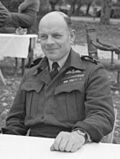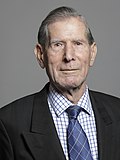| No. | Picture | Chief of the Defence Staff | Took office | Left office | Time in office | Defence branch | Life peerage | Ref. |
|---|
| 1 | | Dickson, William Marshal of the Royal Air Force
Sir William Dickson
(1898–1987)
Previously served as the Chief of the Air Staff | 1 January 1959 | 12 July 1959 | 192 days |  Royal Air Force Royal Air Force | None | [12] |
| 2 | | Mountbatten, Louis Admiral of the Fleet
Louis Mountbatten, 1st Earl Mountbatten of Burma
(1900–1979)
Previously served as the First Sea Lord and Chief of the Naval Staff | 13 July 1959 | 15 July 1965 | 6 years, 2 days |  Royal Navy Royal Navy | Hereditary peerage,
Earl Mountbatten of Burma | [13] |
| 3 | | Hull, Richard Field Marshal
Sir Richard Hull
(1907–1989)
Previously served as the Chief of the General Staff | 16 July 1965 | 4 August 1967 | 2 years, 19 days |  British Army British Army | None | [14] |
| 4 | | Elworthy, CharlesMarshal of the Royal Air Force
Sir Charles Elworthy
(1911–1993)
Previously served as the Chief of the Air Staff | 4 August 1967 | 8 April 1971 | 3 years, 247 days |  Royal Air Force Royal Air Force | Baron Elworthy | [15] [16] |
| 5 | | Hill-Norton, PeterAdmiral of the Fleet
Sir Peter Hill-Norton
(1915–2004)
Previously served as the First Sea Lord and Chief of the Naval Staff | 9 April 1971 | 21 October 1973 | 2 years, 195 days |  Royal Navy Royal Navy | Baron Hill-Norton | [17] |
| 6 | | Carver, MichaelField Marshal
Sir Michael Carver
(1915–2001)
Previously served as the Chief of the General Staff | 21 October 1973 | 24 October 1976 | 3 years, 3 days |  British Army British Army | Baron Carver | [18] [19] |
| 7 | | Humphrey, AndrewMarshal of the Royal Air Force
Sir Andrew Humphrey
(1921–1977)
Previously served as the Chief of the Air Staff | 24 October 1976 | 24 January 1977 † | 92 days |  Royal Air Force Royal Air Force | None | [20] |
| - | | Ashmore, EdwardAdmiral of the Fleet
Sir Edward Ashmore
(1919–2016)
Acting
Previously served as the First Sea Lord and Chief of the Naval Staff | 9 February 1977 | 30 August 1977 | 202 days |  Royal Navy Royal Navy | None | [21] |
| 8 | | Cameron, NeilMarshal of the Royal Air Force
Sir Neil Cameron
(1920–1985)
Previously served as the Chief of the Air Staff | 31 August 1977 | 31 August 1979 | 2 years |  Royal Air Force Royal Air Force | Baron Cameron of Balhousie | [22] [23] |
| 9 | | Lewin, TerenceAdmiral of the Fleet
Sir Terence Lewin
(1920–1999)
Previously served as the First Sea Lord and Chief of the Naval Staff | 1 September 1979 | 30 September 1982 | 3 years, 29 days |  Royal Navy Royal Navy | Baron Lewin | [24] |
| 10 | | Bramall, EdwinField Marshal
Sir Edwin Bramall
(1923–2019)
Previously served as the Chief of the General Staff [a] | 1 October 1982 | 31 October 1985 | 3 years, 30 days |  British Army British Army | Baron Bramall | [25] |
| 11 | | Fieldhouse, JohnAdmiral of the Fleet
Sir John Fieldhouse
(1928–1992)
Previously served as the First Sea Lord and Chief of the Naval Staff | 1 November 1985 | 9 December 1988 | 3 years, 38 days |  Royal Navy Royal Navy | Baron Fieldhouse | [26] |
| 12 | | Craig, DavidMarshal of the Royal Air Force
Sir David Craig
(born 1929)
Previously served as the Chief of the Air Staff | 9 December 1988 | 1 April 1991 | 2 years, 113 days |  Royal Air Force Royal Air Force | Baron Craig of Radley | [27] |
| 13 | | Vincent, RichardField Marshal
Sir Richard Vincent
(1931–2018)
[a] | 2 April 1991 | 31 December 1992 | 1 year, 273 days |  British Army British Army | Baron Vincent of Coleshill | [28] |
| 14 | | Robin Harding, PeterMarshal of the Royal Air Force
Sir Peter Harding
(1933–2021)
Previously served as the Chief of the Air Staff | 31 December 1992 | 13 March 1994 | 1 year, 72 days |  Royal Air Force Royal Air Force | None | [29] |
| 15 | | Inge, PeterField Marshal
Sir Peter Inge
(1935–2022)
Previously served as the Chief of the General Staff | 15 March 1994 | 1 April 1997 | 3 years, 17 days |  British Army British Army | Baron Inge | [30] |
| 16 | | Guthrie, Charles General
Sir Charles Guthrie
(1938–2025)
Previously served as the Chief of the General Staff | 2 April 1997 | 15 February 2001 | 3 years, 319 days |  British Army British Army | Baron Guthrie of Craigiebank | [31] |
| 17 | | Boyce, Michael Admiral
Sir Michael Boyce
(1943–2022)
Previously served as the First Sea Lord and Chief of the Naval Staff | 16 February 2001 | 2 May 2003 | 2 years, 75 days |  Royal Navy Royal Navy | Baron Boyce | [32] |
| 18 | | Walker, MichaelGeneral
Sir Michael Walker
(born 1944)
Previously served as the Chief of the General Staff | 2 May 2003 | 28 April 2006 | 2 years, 361 days |  British Army British Army | Baron Walker of Aldringham | [33] |
| 19 | | Stirrup, Jock Air Chief Marshal
Sir Graham "Jock" Stirrup
(born 1949)
Previously served as the Chief of the Air Staff | 28 April 2006 | 29 October 2010 | 4 years, 184 days |  Royal Air Force Royal Air Force | Baron Stirrup of Marylebone | [34] |
| 20 | | Richards, DavidGeneral
Sir David Richards
(born 1952)
Previously served as the Chief of the General Staff | 29 October 2010 | 18 July 2013 | 2 years, 271 days |  British Army British Army | Baron Richards of Herstmonceux | [35] [36] |
| 21 | | Houghton, NickGeneral
Sir Nicholas Houghton
(born 1954)
Previously served as the Vice-Chief of the Defence Staff | 18 July 2013 | 14 July 2016 | 2 years, 362 days |  British Army British Army | Baron Houghton of Richmond | [37] [38] |
| 22 | | Houghton, NickAir Chief Marshal
Sir Stuart Peach
(born 1956)
Previously served as the Vice-Chief of the Defence Staff | 14 July 2016 | 11 June 2018 | 1 year, 332 days |  Royal Air Force Royal Air Force | Baron Peach | [39] |
| 23 | | Houghton, NickGeneral
Sir Nicholas Carter
(born 1959)
Previously served as the Chief of the General Staff | 11 June 2018 | 30 November 2021 | 3 years, 172 days |  British Army British Army | None | [40] |
| 24 | | Radakin, TonyAdmiral
Sir Tony Radakin
(born 1965)
Previously served as the First Sea Lord and Chief of the Naval Staff | 30 November 2021 | 2 September 2025 | 3 years, 276 days |  Royal Navy Royal Navy | None | [41] |
| 25 | | Knighton, RichardAir Chief Marshal
Sir Richard Knighton
(born 1969)
Previously served as the Chief of the Air Staff | 2 September 2025 | Incumbent | 74 days |  Royal Air Force Royal Air Force | Incumbent | [42] |























